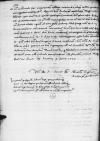Rem maxime gratam Vestra Reverendissima Dominatio fecit nos suis litteris visendo suumque vetustum affectum declarando, quem quidem affectum nos magni facimus, irae enim amantium, ut illud Terentianum est, faciunt amoris reintegrationem, Vestra igitur Reverendissima Dominatio vetusto nos amet amore et nos respondebimus, quia ex corde quicquid rancoris natum fuit, evulsimus neque aliter sibi Reverendissima Dominatio Vestra persuadeat de nobis. Quod vero ad nostri nepotis scholastici negotium attinet, inveniemus modum, quo beneficium sibi exhibitum liberaliter recompensemus, Vestra itaque Reverendissima Dominatio boni consulat, quod cum ea nuper super ea re liberius commentati simus.
Exspectabamus Vestrae Reverendissimae Dominationis et magnifici domini ⌊palatini Marienborgensis⌋ earum rerum exitum cognoscere, quas cum ⌊magistratu Gdanensi⌋ mandato sacrae ⌊maiestatis regiae⌋ egistis et maxime in religionis statu, sed ex Vestrae Reverendissimae Dominationis scriptis atque ex responso Vestris Dominationibus dato per magistratum non aliud colligere possumus, quam quod illa ⌊civitas⌋ sit et manet in ambigua religione et praesertim, quod auctore pernicioso monacho ⌊Pancratio ⌋carere non vult, verendum itaque est, ne civitas magistratu connivente in deteriora ... illegible⌈...... illegible⌉ labatur. Et ideo Vestris Dominationibus, qui isti patriae praesidetis, invigilandum est utraque aure, ut emendatio fiat, cf. Cic. Off. 1.81 Quamquam hoc animi, illud etiam ingenii magni est, praecipere cogitatione futura et aliquanto ante constituere, quid accidere possit in utramque partem et quid agendum sit, cum quid evenerit, nec committere, ut aliquando dicendum sit “non putaram”.; V. Max. 7.2.2 Scipio vero Africanus turpe esse aiebat in re militari dicere “non putaram”, videlicet quia explorato et excusso consilio quae ferro aguntur administrari oportere arbitrabatur. Summa ratione: inemendabilis est enim error, qui violentiae Martis committitur.; Sen. Dial. 4.31.4 Turpissimam aiebat Fabius imperatori excusationem esse “non putaui”, ego turpissimam homini puto. Omnia puta, exspecta ⌊ne veniat dicendum: non putaramcf. Cic. Off. 1.81 Quamquam hoc animi, illud etiam ingenii magni est, praecipere cogitatione futura et aliquanto ante constituere, quid accidere possit in utramque partem et quid agendum sit, cum quid evenerit, nec committere, ut aliquando dicendum sit “non putaram”.; V. Max. 7.2.2 Scipio vero Africanus turpe esse aiebat in re militari dicere “non putaram”, videlicet quia explorato et excusso consilio quae ferro aguntur administrari oportere arbitrabatur. Summa ratione: inemendabilis est enim error, qui violentiae Martis committitur.; Sen. Dial. 4.31.4 Turpissimam aiebat Fabius imperatori excusationem esse “non putaui”, ego turpissimam homini puto. Omnia puta, exspecta ⌋. Religionis enim integritate, ut Vestra Reverendissima Dominatio novit, gentium status firmantur et religionis mutatione infirmantur et plerumque dissolvuntur. Placet siquidem nobis opera et studium Vestrarum Dominationum simul et industria, qua usi estis, ut eius ⌊civitatis⌋ status et fides erga ⌊maiestatem regiam⌋ firmaretur, maxime his temporibus, quando ubique furor pro ratione vigeat et ideo sacra maiestas regia per Vestras Dominationes bono consilio, quid facere debeat, erat instruenda. Sed nostra aetas, iam in viribus hebes orig. ebes⌈hebeshebes orig. ebes⌉, non patitur, ut illuc aliquando veniamus, ubi tamen proficere possemus, quia vitae nostrae solemus praeponere bonum statum ⌊reipublicae⌋ neque hunc laborem horreremus. Verum Vestrae Dominationes, quae sapientissimae sunt, dubio procul salutem suae gentis ex omni parte conservabunt et sacram ⌊maiestatem regiam⌋ a sollicitudine liberabunt.
Quae nova hic habemus, Vestrae Reverendissimae Dominationi mitto et eadem ex urbe specialiter nobis scripta sunt. Dominus Deus prosperet ⌊caesaream maiestatem⌋, ut praevaleat in istos Philisteo<s> funda et lapide. Utinam et vestrum bellum, quod ⌊Lubicenses⌋ stulte  BCz 249, p. 182 et cum incommodo suo in perniciem multorum nutriunt, aliquando cesset, quatenus navigatio restituatur.
BCz 249, p. 182 et cum incommodo suo in perniciem multorum nutriunt, aliquando cesset, quatenus navigatio restituatur.
Reverendissimus dominus ⌊archiepiscopus Upsaliensis⌋ nuper nobis scribens egit Vestrae Reverendissimae Dominationi gratias, quod ipsum humaniter, dum ⌊Gdani⌋ esset, habuerit et tractaverit et quod nostri in simposiis una cum reverendissimo ⌊domino Lubucensi⌋ non fuerit oblita, quam ob rem gratias habemus. Nos quoque Vestrae Reverendissimae Dominationis in bona occasione non erimus immemores, bonum pro bono reddentes. Hodie etiam habemus a reverendissimo ⌊domino Cracoviensi⌋ nuntium et magna animi gratitudine intelleximus suam reverendissimam dominationem satis recte ex tam gravi aegritudine convaluisse, quem nobis Dominus Deus longaeve servet incolumem.
Cum Vestra Reverendissima Dominatio nobis scribere volet, poterit ad dominum Lipowyecz, vel ad cancellarium reverendissimi ⌊episcopi Vladislaviensis⌋, dominum Stanislaum Dambrowsky, qui ⌊Vladislaviae⌋ manet, litteras mittere hidden by binding⌈[ere]ere hidden by binding⌉ et illorum cura nobis subinde transmittentur. Et felicissime valeat nosque fraterne amet.
 BCz 249, p. 182 et cum incommodo suo in perniciem multorum nutriunt, aliquando cesset, quatenus navigatio restituatur.
BCz 249, p. 182 et cum incommodo suo in perniciem multorum nutriunt, aliquando cesset, quatenus navigatio restituatur.


